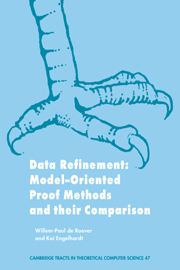Preface
Published online by Cambridge University Press: 03 May 2010
Summary
The goal of this monograph is the introduction of, and comparison between, various methods for proving implementations of programs correct. Although these methods are illustrated mainly by applying them to correctness proofs of implementations of abstract data structures, the techniques developed apply equally well to proving correctness of implementations in general. For we shall prove that all these methods are only variations on one central theme: that of proof by simulation, of which we analyze at least 13 different formulations.
As the central result we prove that these methods either imply or are equivalent to L-simulation (also called forward or downward simulation in the literature) or a combination of L- with L−1-simulation (the latter is also called backward or upward simulation). Since, as shown by Hoare, He, and Sanders, only the combination of these forms of simulation is complete, this immediately establishes when these methods are complete, namely, when they are equivalent to this combination.
Our motivation for writing this monograph is that we believe that in this area of computer science (as well as in various other areas) the duty of universities is not to train students in particular methods, but rather to give students insight in both similarities and differences between methods such as VDM, Z, the methods advocated by Reynolds and Hehner, and methods more directly based on Hoare Logic or predicate transformers. The reason for this conviction is that computer science develops far too quickly for us to believe that any of these methods will survive in its present form.
Information
- Type
- Chapter
- Information
- Data RefinementModel-Oriented Proof Methods and their Comparison, pp. viii - xiiPublisher: Cambridge University PressPrint publication year: 1998
